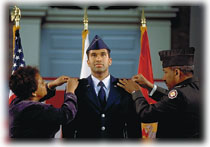![]()
Main Menu ·
Search ·
Current Issue · Contact · Archives · Centennial · Letters to the Editor · FAQs
![]()
Main Menu ·
Search ·
Current Issue · Contact · Archives · Centennial · Letters to the Editor · FAQs
 His parents pin insignia on newly commissioned 2d Lt. Gregory David '99, USAF.Stu Rosner
His parents pin insignia on newly commissioned 2d Lt. Gregory David '99, USAF.Stu Rosner |
In the late 1960s and early '70s, many undergraduates were protesting the military and the Vietnam War. A generation later, some students are asking the University to bring the armed forces' Reserve Officers Training Corps (ROTC), exiled from Harvard in 1970, back to campus.
Then the draft hung over every male college student like an inescapable shadow. "The knowledge that the draft was out there colored all kinds of decisions," recalls dean of the College Harry R. Lewis '68. "Men could not take a term off to get their heads together, because they would be sent to Vietnam. Professors who failed students were public enemies, because those students might be killed in Vietnam because they'd flunked a course at Harvard." Following the student strike of 1969, the Faculty of Arts and Sciences (FAS), which had already voted to end academic credit for military-science courses, voted to reduce ROTC to extracurricular status. Since then, Harvard ROTC cadets have traveled to MIT for classes and drills.
Fast-forward 30 years, and the anti-ROTC rationale has changed from concern about an unjust war to protest at unjust discrimination. In 1993, when "Don't ask, don't tell"--rather than acceptance of gays in the military--became Defense Department policy, faculty members voted to urge the University to stop paying the fees MIT charged to include Harvard students in its program. Although the University still permits a commissioning ceremony for Harvard and Radcliffe cadets each June on the steps of Memorial Church, alumni have covered the MIT fees.
With the U.S. busy exercising the role of global policeman, the military has come under renewed student scrutiny, pro and con. In April, the Undergraduate Council voted in favor of a highly controversial proposal to work with the administration to bring ROTC back. The bill does not, of course, bind the administration, and Dean Lewis said there were no immediate plans to reinstate ROTC; because the military still rejects avowed homosexuals, he noted, FAS continues to reject affiliation with ROTC. But the issue stirred impassioned comment--mostly from noncadets.
Many students in ROTC see themselves caught between two large and stubborn institutions that can't resolve their complex conflicts. ROTC "cannot, and should not be able to, change the military," says Justin Porter '99, who was commissioned a second lieutenant this June. "If students, administrators, or faculty have political objections to American military policies, they should voice their concerns to the men and women who make political decisions in Washington, D.C." Porter also asserts that Harvard's moral stands are limited by its own self-interest. "Harvard's principles go only so far. They go far enough to hinder its own students who aspire to serve our nation, but not far enough to sacrifice its own federal funding."
~ Jennifer 8. Lee
Main Menu ·
Search · Current Issue · Contact · Archives · Centennial · Letters to the Editor · FAQs
![]()